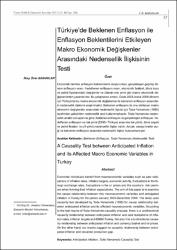| dc.contributor.author | Badurlar, Öner İlkay | |
| dc.date.accessioned | 2019-10-21T19:43:38Z | |
| dc.date.available | 2019-10-21T19:43:38Z | |
| dc.date.issued | 2011 | |
| dc.identifier.issn | 1307-7112 | |
| dc.identifier.uri | http://www.trdizin.gov.tr/publication/paper/detail/TVRFNE5EZ3hNUT09 | |
| dc.identifier.uri | https://hdl.handle.net/11421/19667 | |
| dc.description.abstract | Ekonomik birimler enflasyon beklentilerini oluştururken, gerçekleşen geçmiş dönem enflasyon oranı, hedeflenen enflasyon oranı, ekonomik faaliyet, döviz kuru ve petrol fiyatlarındaki değişimler ve ülkenin risk primi gibi makro ekonomik değişkenlerden yararlanırlar. Bu çalışmanın amacı, Ocak 2003-Aralık 2009 dönemi için Türkiye'de bu makro ekonomik değişkenler ile beklenen enflasyon arasındaki nedensellik ilişkisini araştırmaktır. Beklenen enflasyon ile onu etkileyen makro ekonomik değişkenler arasındaki nedensellik ilişkisi için Toda-Yamamoto (1995) tarafından geliştirilen nedensellik testi kullanılmaktadır. Toda-Yamamoto nedensellik analizi sonuçlarına göre; beklenen enflasyon ile gerçekleşen enflasyon, hedeflenen enflasyon ve risk primi (EMBI+Türkiye) arasında tek yönlü, döviz sepeti ve petrol fiyatları ile çift yönlü nedensellik ilişkisi vardır. Ancak, sanayi üretim açığı ile beklenen enflasyon arasında nedensellik ilişkisi bulunamamıştır. | en_US |
| dc.description.abstract | Economic individuals benefit from macroeconomic variables such as past realizations of inflation rates, inflation targets, economic activity, fluctuations in the foreign exchange rates, fluctuations in the oil prices and the country's risk premium when forming their inflation expectations. The aim of this paper is to examine the causal relationship between this macroeconomic variables and anticipated inflation in Turkey for the period January 2003-December 2009. The study uses causality test developed by Toda-Yamamoto (1995) for causal relationship between anticipated inflation and its affected macroeconomic variables. According to the test results of Toda-Yamamoto causality analysis, there is a unidirectional causality relationship between anticipated inflation and past realizations of inflation rates, inflation targets and EMBI+Turkey. We also find a bi-directional causality relationship between anticipated inflation and currency basket and oil prices. On the other hand; our results suggest no causality relationship between anticipated inflation and industrial production gap. | en_US |
| dc.language.iso | tur | en_US |
| dc.rights | info:eu-repo/semantics/openAccess | en_US |
| dc.subject | İktisat | en_US |
| dc.subject | İşletme Finans | en_US |
| dc.title | Türkiye'de beklenen enflasyon ile enflasyon beklentilerini etkileyen makro ekonomik değişkenler arasındaki nedensellik ilişkisinin testi | en_US |
| dc.title.alternative | A causality test between anticipated inflation and its affected macro economic variables in Turkey | en_US |
| dc.type | article | en_US |
| dc.relation.journal | Finans Politik ve Ekonomik Yorumlar Dergisi | en_US |
| dc.contributor.department | Anadolu Üniversitesi, Eskişehir Meslek Yüksekokulu | en_US |
| dc.identifier.volume | 48 | en_US |
| dc.identifier.issue | 556 | en_US |
| dc.identifier.startpage | 57 | en_US |
| dc.identifier.endpage | 65 | en_US |
| dc.relation.publicationcategory | Makale - Ulusal Hakemli Dergi - Kurum Öğretim Elemanı | en_US] |


















